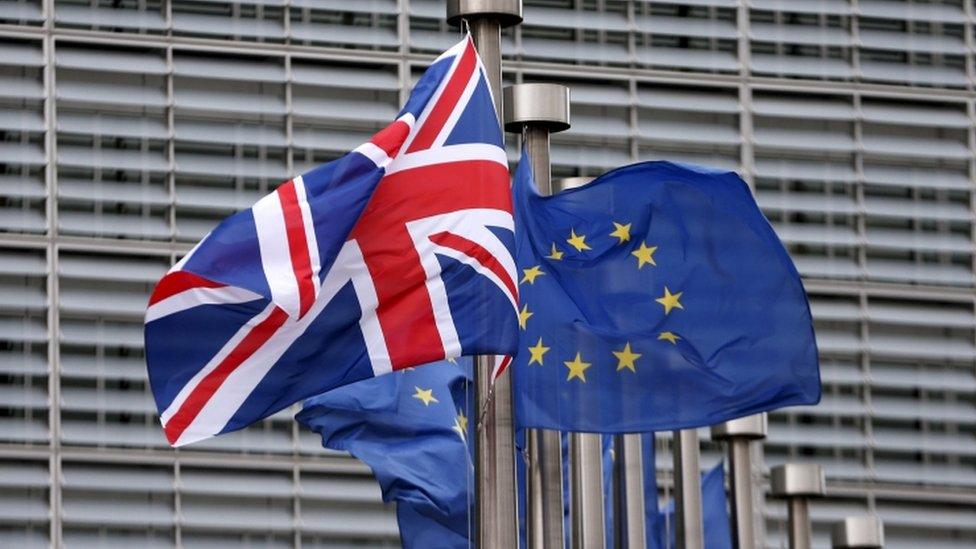Reality Check: Did the UK lose its sovereignty in 1972?
- Published

Mayor of London Boris Johnson says: "You cannot express the sovereignty of Parliament and accept the 1972 European Communities Act."
Is he right?
BBC legal affairs correspondent Clive Coleman has the answers.
What exactly is parliamentary sovereignty?
It means Parliament is the big dog. It can lumber around the constitution passing any law it likes. None of the smaller dogs can challenge the big fella.
Or, if you want a less canine definition, Parliament's own website defines it as "a principle of the UK constitution. It makes Parliament the supreme legal authority in the UK, which can create or end any law. Generally, the courts cannot overrule its legislation and no Parliament can pass laws that future Parliaments cannot change. Parliamentary sovereignty is the most important part of the UK constitution".
Like I said, the big dog.
OK - but did we lose parliamentary sovereignty in 1972?
Yes, some of it. The big dog agreed to give up some kennel space.
Or if you want that in a less doggy way, in 1972 the UK Parliament passed the European Communities Act. It gave direct effect to EU law and meant that if there was a conflict between an act of the British Parliament and EU law, Parliament lost out and EU law prevailed. The European Court of Justice (ECJ) became a kind of Supreme Court of Europe, interpreting EU law with judgements that were binding on all member states.
Rhodri Thompson QC, a specialist in EU law, puts it this way: "The basic relationship between UK and EU law has been clear since 1972 - Parliament remains sovereign but recognises the binding nature of EU law. The only other mechanism, used by some other member states, is to entrust ultimate national sovereignty to their constitutional courts as guardians of a written constitution."
Germany and its constitutional court is the example often cited, giving the impression it has a muscular German shepherd guarding its constitutional independence, in comparison with the weaker British spaniel. However, that is not the case. Germany does not have parliamentary sovereignty. If the UK moved to a model based upon a written constitution guaranteed by a constitutional court, it would be passing sovereignty to a group of unelected judges and taking it away from Parliament. No-one, including the prime minister, seems to think such a seismic constitutional shift is a good idea.
Right, so does that mean part of our parliamentary sovereignty has gone forever?
Down, Fido! Absolutely not. Parliament could repeal the 1972 Act and take back the part of its sovereignty that was lost to EU law. What Parliament gives, Parliament can take back. On its website, Parliament says: "Over the years, Parliament has passed laws that limit the application of parliamentary sovereignty. These laws reflect political developments both within and outside the UK. They include the UK's entry to the European Union in 1973.
"These developments do not fundamentally undermine the principle of parliamentary sovereignty, since, in theory at least, Parliament could repeal any of the laws implementing these changes."

Come on, isn't there some way to beef up the sovereignty of our Parliament short of repealing the 1972 European Communities Act?
Can we make the big British bulldog bark a bit louder at the EU?
Isn't that what the prime minister meant when he told the BBC's Andrew Marr on 21 February: "We're going to set out in the coming days proposals… to make clear that… the British Parliament is sovereign. We have chosen to join the EU, we could choose to leave the EU, and I think there's some important work to put that point beyond doubt."
Is there some additional power - bark and bite if you like - that can be given to Parliament that rebalances the power relationship between it and the EU? Not according to the Mayor of London, Boris Johnson.
He told Andrew Marr on 6 March: "A huge intellectual effort went into creating this language by which we could somehow ensure that... our courts, our Supreme Court, our House of Commons, could overturn judgements of the European Court of Justice if we felt, if Britain felt, that they were in some way capricious or if they were going beyond the Treaty."
But he added that the government lawyers "just blew up. And they, you know, they said this basically voids our obligations under the 1972 European Communities Act, it doesn't work, we can't - and that is, I'm afraid, the reality. You cannot express the sovereignty of Parliament and accept the 1972 European Communities Act. There's no way of doing both at the same time."
There it is, that's the view of the big Labrador of British politics (that's Boris Johnson) of the way the big parliamentary dog is currently kennelled. Yes, I am persisting with this canine imagery.
Is he right? No. Parliamentary sovereignty has never gone away or lost its "expression", because Parliament can scrap the 1972 Act.
But, says Prof Takis Tridimas, chair of European law at King's College London, creating entirely new rules for the UK to ignore or sidestep EU law is not really a runner.
"What is not on offer is selective compliance with EU law, i.e. a situation where Parliament picks and chooses which provisions of EU law to follow and which not to follow on a case-by-case basis. This is not on offer under any international agreement."
In other words, the big dog can't be a member of the club and play by a different set of rules from all the other dogs. It has to obey the rules or leave the club.
If the UK votes to stay in the EU it will have to let sleeping dogs lie, in the sense that it will have to continue to accept the primacy of EU law. If it votes to leave, the big dog is back in charge.


READ MORE: The truth behind claims in the EU debate

- Published22 February 2016

- Published29 February 2016
